Juan is a Venezuelan migrant being served by a shelter at Sacred Heart Parish in El Paso, Texas. The church is located just a few steps from the border. Catholic Extension Society helped build it in 1916 and has continued to support it for more than 100 years.
Juan came to the U.S. on New Year’s Day 2023, among the surge of thousands of migrants who have passed through El Paso in the last month. The tragedy of his story is all too familiar.
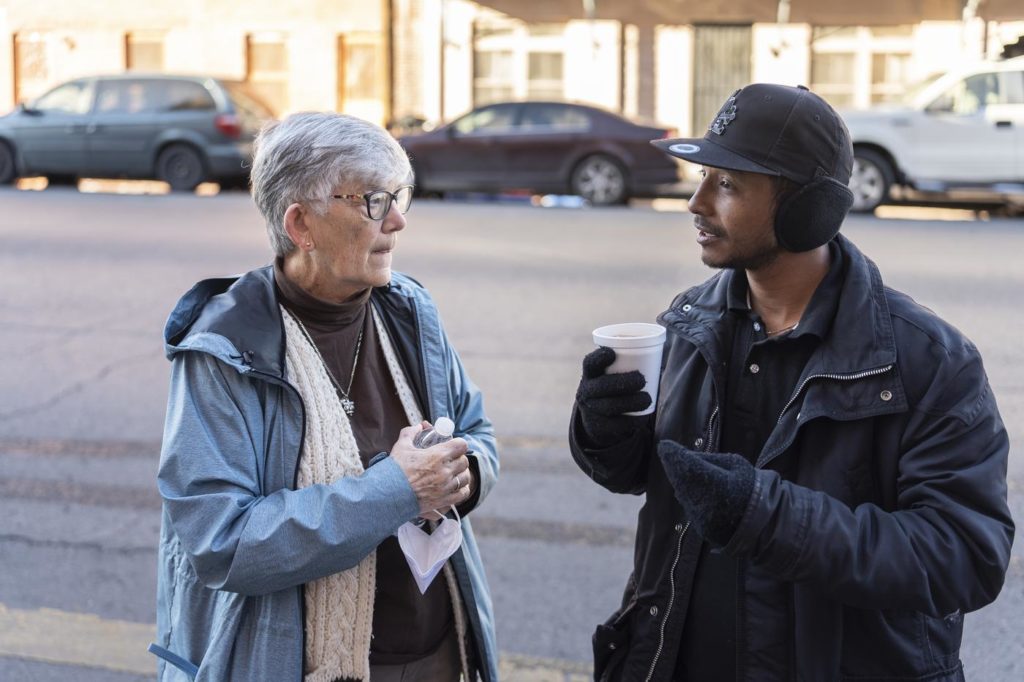
The 37-year-old teacher couldn’t earn a living when his government banned him from teaching for political reasons. He was forced to take a day job at a bakery, and a night job at a club. He spent half of his $30-a-month salary on transportation to his various jobs. All of his free time was spent in long lines trying to buy what little food was available to feed his wife and two kids. Sometimes he would wait up to 48 hours in line just to buy a kilo of flour.
He moved his family to Costa Rica, but they couldn’t make it there either, prompting his tough decision to leave his wife and kids and come to the U.S. Along the way, the cartel in Mexico stole his phone and money. So, he hitched a ride on “La Bestia” (The Beast) —the infamous freight trains of Mexico that migrants dangerously cling to for hours to go northward. Now in the U.S., he is trying to figure out his next steps.
Juan’s story is yet another reminder that migration and its causes are complex. So too are its solutions. It is why the situation at the southern border seems to change constantly and elicits endless debate. Leaders of all parties and ideologies admit to rampant failures, although none accept any blame. They use words like “broken” or “chaotic” when describing the phenomenon of migration.
How can a person understand what is going on down there, let alone know how to respond to it?
How the Catholic Church is responding on the border
The Catholic Church at the southern border, which Catholic Extension Society has partnered with for well over a century, has always taken a simple but effective approach. They treat migrants as vulnerable people and give witness to their human dignity amid their atrocious circumstances.
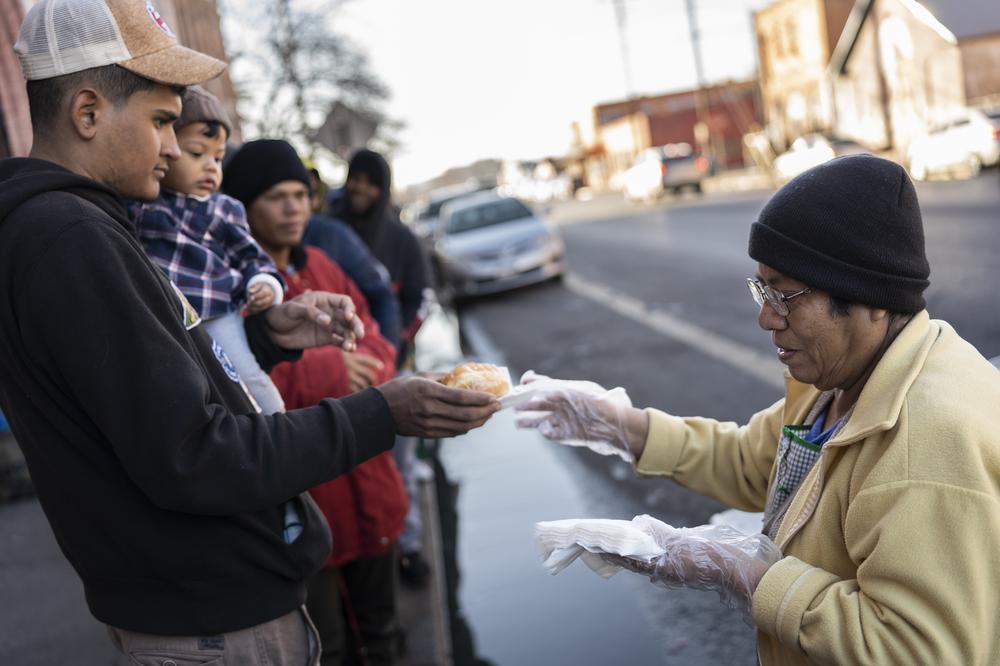
The Church knows that migrants are people who have been frequently betrayed. They’ve been betrayed by their governments, who cannot maintain security or economic and political stability. They are betrayed by the cartels that endlessly prey on migrants who they view as a commodity to be exploited.
Another migrant, José, has seen this betrayal up close. He is in his 20s and arrived at the Sacred Heart Parish Shelter after a four-month trek from Venezuela. He hobbled in with a torn knee ligament, an injury sustained along the way. Still, he felt blessed. While in Mexico, he witnessed two of his traveling companions get kidnapped by the cartel and he never heard from them again. He was miraculously spared. As he spoke with a religious sister attending to him in the Parish Hall with the concern of a mother, he told her that God served as his personal guardian on his treacherous journey.
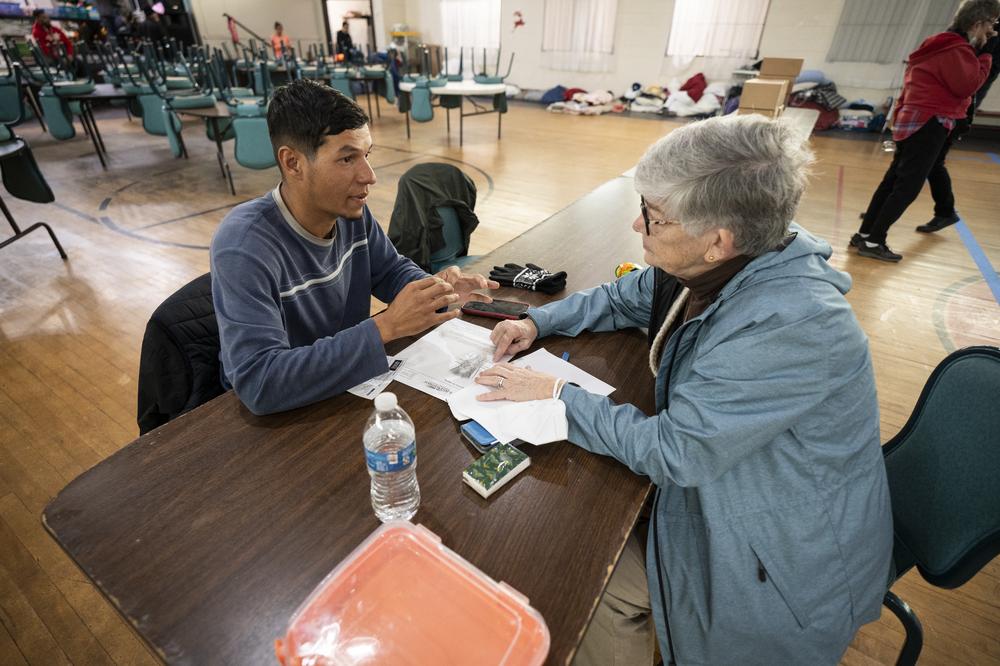
Most of the people at Sacred Heart have stories like Juan and José, and in the midst of so much inhumanity, the simplest gestures go a long way to restore dignity. A hot meal; a warm drink in the 27-degree low temperatures of the El Paso winter; a dose of medicine for a man with a night-time fever and no coat; a Barbie doll given to a young girl as she waits outside not knowing where she is going next.
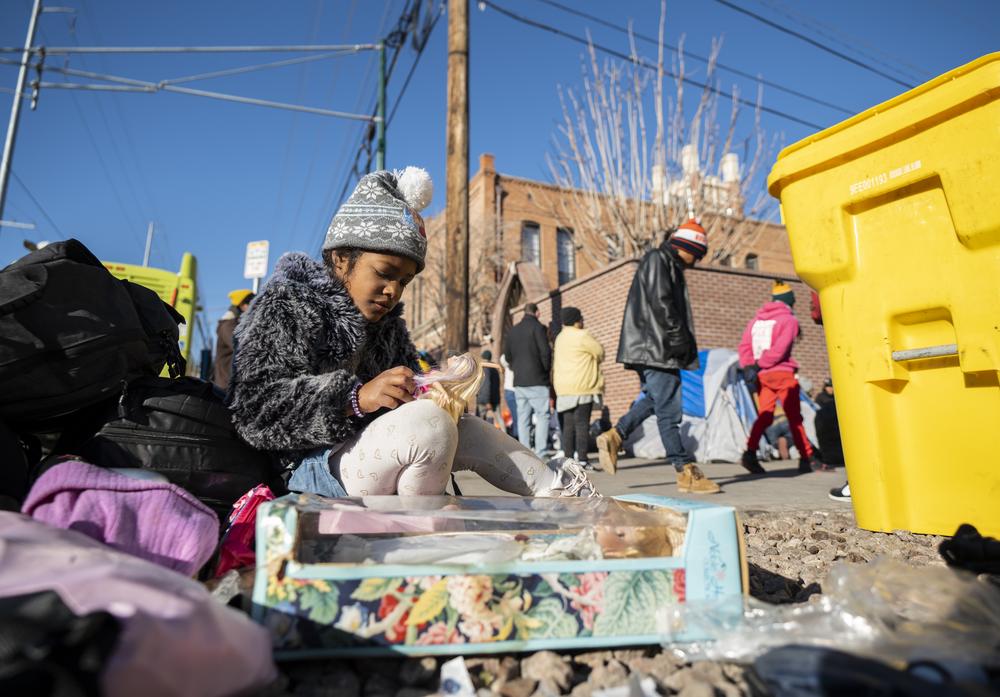
Amid the complexity of migration, these are the simple gestures and services the Catholic Church is providing to migrants, and it makes all the difference in the world.
All the migrants arriving at Sacred Heart had been the victim of some form or crime or indignity along their journey: robbing, beating, fleecing, frisking, imprisonment, physical accidents or abuse. Amazingly, José and many others said that crossing crocodile-infested waters and stepping over the poisonous snakes of the jungle in Panama’s Darién Gap was actually the easiest part.
That is why just a little love for these migrants—who have been betrayed and beaten down at every turn—is an absolute moment of transformation. While their futures are still so uncertain, some love, respect, and compassion are the greatest stabilizing forces that can be offered to them by the Church.
Warmth and light for migrants suffering in the cold
In Dante’s “Inferno,” the lowest level of Hell is the place where betrayers and betrayal reigns. And it’s bitterly cold there. Walking through the streets of El Paso, which are littered with shivering bodies under thin blankets in the subfreezing night, are souls whose despair stems from so much betrayal. And to see these restless souls sleeping on the rocks and cold concrete sidewalks feels like a stroll through Hell.
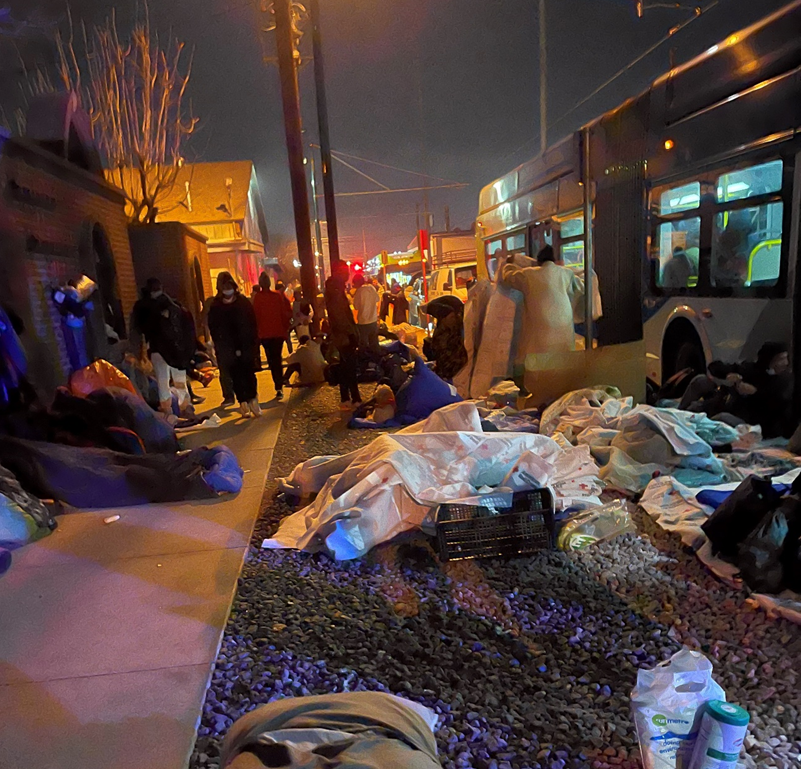
Women and children are given the limited space to sleep indoors at the parish hall. Meanwhile, the men squeeze together like sardines on the perimeter of the Church, as it is the only place where they feel some sense of safety and security. Food and other provisions are brought out to those left outside. It’s the best that the parish can do during this recent surge of migrants, which has overwhelmed governmental and nonprofit organizations alike. Outside the parish hall, the night is cold, the pain and agony of hundreds of people is real. But, they are within reach of a presence of hope that keeps coming out to them.
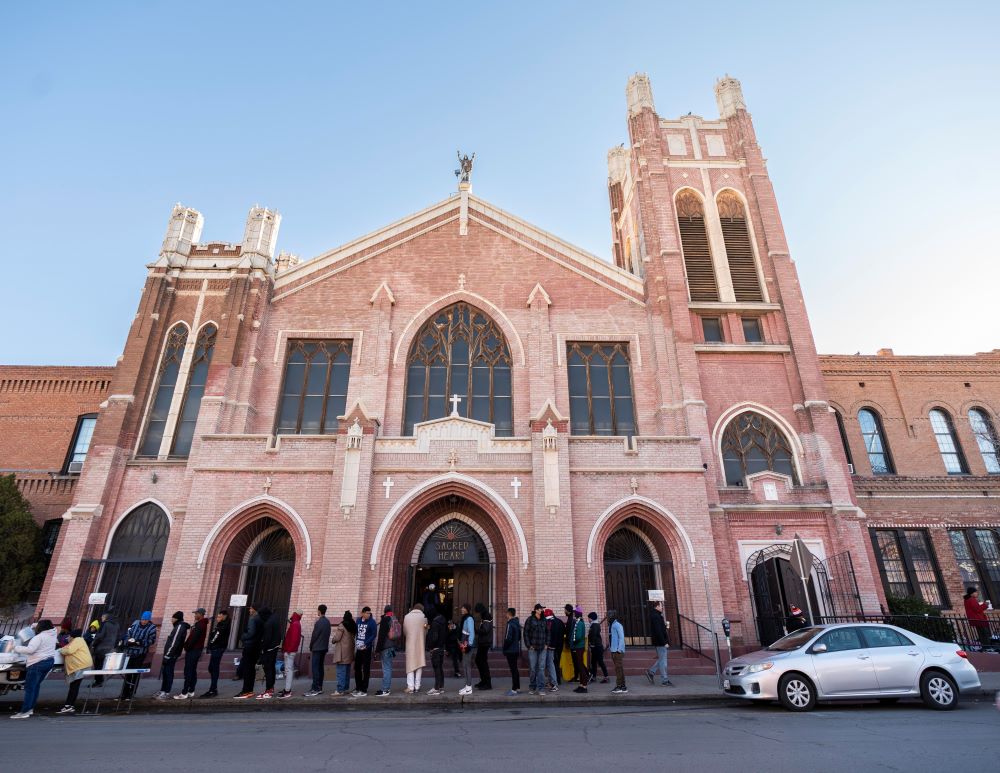
In the Apostles’ Creed, there is a phrase that says, “He descended into Hell.” This was Jesus’ final step of plunging into our human experience—by actually dying and descending to the place of the dead. And our catechism teaches that “it was out of the depths of death that he made life spring forth.” (631)
Among these “huddled masses” of migrants at Sacred Heart Church in El Paso, the Church is replicating Jesus’ own actions of descending into this hell and, “proclaiming the Good News to the spirits imprisoned there.” (632)
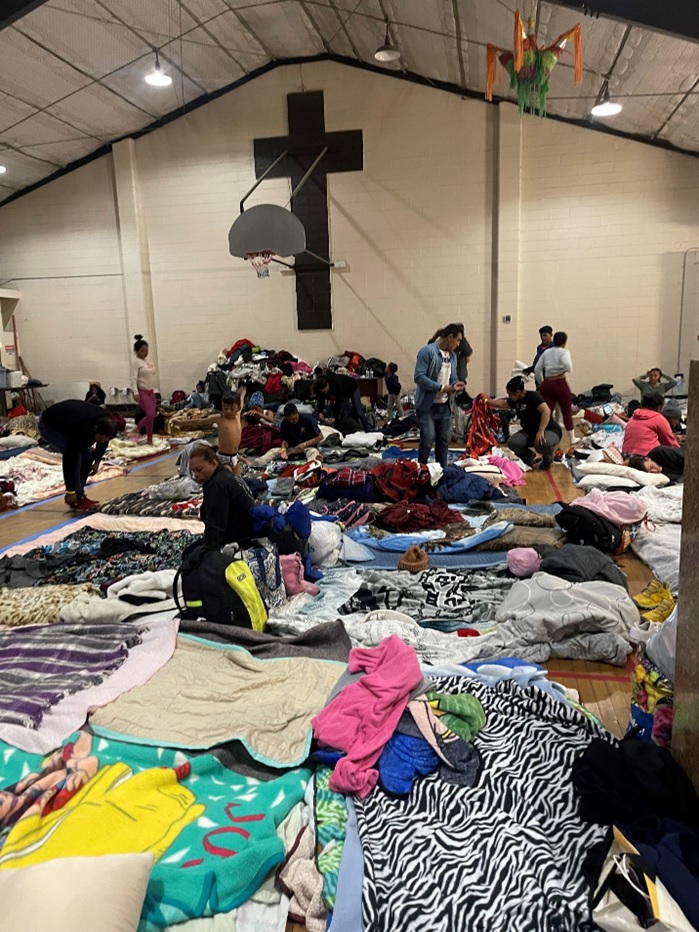
The Catholic leaders reaching out to migrants in El Paso and all along the U.S.-Mexico border who collaborate with Catholic Extension Society do not look away. They do not hide in the sacristy. They do not say “this is too complex of a problem for us to do anything meaningful.” Rather, they jump right into the sea of makeshift tents and the mangled blankets. Like Jesus, they are grabbing people by the hands, and lifting them up from the depths of despair, helping them find the light in the middle of the dark of night.
These bearers of light are people like Efren Loya, a 24-year-old recent graduate of the University of Texas at El Paso.
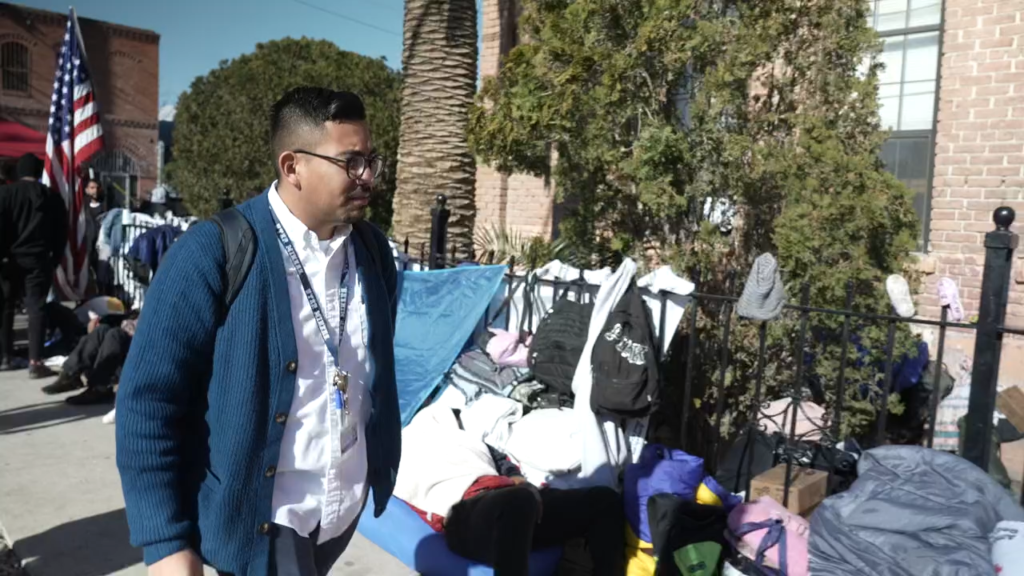
He serves as the parish director of religious education. His heart is moved when he meets migrants, especially those his own age. Efren cannot help but aid them. On top of his day job at the parish, he takes regular shifts at odd hours at the parish shelter by serving the food, passing out coats—doing whatever he can do to help restore the human dignity of migrants. He learns their names and he knows their faces.
How to help asylum seekers in El Paso
Sometimes, when we are confronted with the most complex realities of life, as global migration certainly is, the simplest of gestures and actions are the ones that make the most sense. Feed the hungry, give drink to the thirsty, offer a clean shower to the weary. This is what they do at Sacred Heart, as do so many other parishes and ministries across the southern border with whom we have the privilege of collaborating.
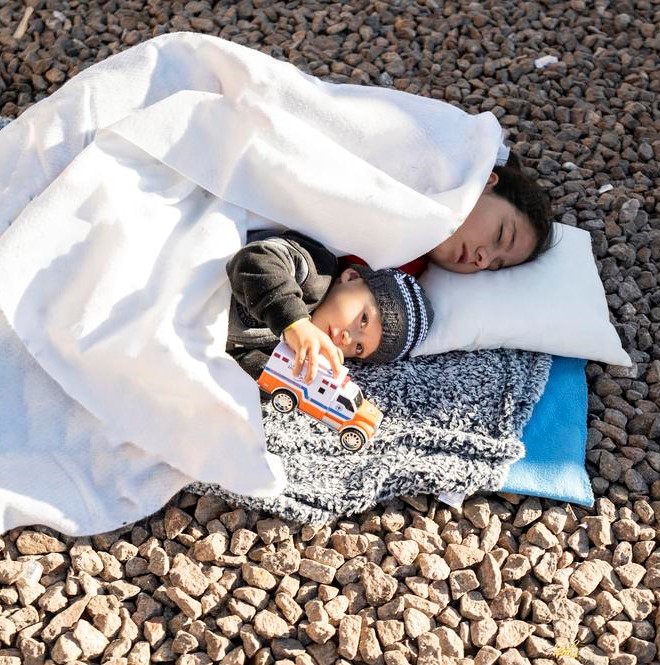
To support this important work, consider making a donation to our Holy Family Fund.


